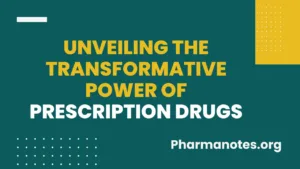Unveiling the Transformative Power of Prescription Drugs

Introduction: Exploring the Realm of Prescription Drugs
Prescription drugs stand as pillars in the realm of modern medicine, offering a spectrum of solutions to an array of health conditions. From alleviating chronic pain to managing complex diseases, these pharmaceutical marvels play a pivotal role in enhancing and prolonging human life.
Understanding Prescription Drugs: A Deep Dive
What are Prescription Drugs?
Prescription drugs, also known as prescription medications, are pharmaceuticals that require a valid prescription from a licensed healthcare provider. These medications are regulated by governmental bodies to ensure safety, efficacy, and proper usage.
Types of Prescription Drugs
Prescription drugs encompass a diverse range of categories, each tailored to address specific health concerns. These categories include:
- Antibiotics: Combat bacterial infections.
- Analgesics: Relieve pain without causing loss of consciousness.
- Antidepressants: Manage symptoms of depression and anxiety.
- Antihypertensives: Lower blood pressure to reduce the risk of cardiovascular events.
- Anticonvulsants: Control seizures in individuals with epilepsy.
- Antipsychotics: Treat psychotic disorders like schizophrenia.
- Antineoplastics: Fight cancer cells and inhibit tumor growth.
- Hormonal medications: Regulate hormonal imbalances and conditions such as hypothyroidism or hormonal contraceptives.
The Impact of Prescription Drugs on Health and Well-being
Enhancing Quality of Life
Prescription drugs have revolutionized healthcare by significantly improving the quality of life for millions worldwide. Patients suffering from chronic conditions such as diabetes, arthritis, or hypertension can effectively manage their symptoms and lead fulfilling lives with the aid of these medications.
Disease Management and Prevention
The judicious use of prescription drugs plays a pivotal role in managing and preventing various diseases. For instance, individuals with a predisposition to cardiovascular ailments can benefit from medications that lower cholesterol levels and regulate blood pressure, thus mitigating the risk of heart attacks and strokes.
Prolonging Lifespan
In many cases, prescription drugs are instrumental in prolonging lifespan and preventing premature mortality. Patients diagnosed with cancer, HIV/AIDS, or autoimmune disorders can undergo targeted therapy regimes that suppress disease progression and enhance survival rates.
Safety and Regulation of Prescription Drugs
Rigorous Testing and Approval Process
Before reaching the hands of consumers, prescription drugs undergo rigorous testing and evaluation to ensure safety, efficacy, and quality. Regulatory agencies such as the Food and Drug Administration (FDA) in the United States and the European Medicines Agency (EMA) in Europe meticulously review clinical trial data and manufacturing practices to approve medications for market distribution.
Monitoring Adverse Effects
Post-marketing surveillance mechanisms enable continuous monitoring of prescription drugs for adverse effects and unexpected reactions. Healthcare providers and patients are encouraged to report any adverse events to regulatory authorities, facilitating timely interventions and product recalls if necessary.
The Role of Healthcare Providers in Prescription Drug Management
Personalized Treatment Approaches
Healthcare providers, including physicians, nurse practitioners, and pharmacists, play a crucial role in prescribing and managing prescription drugs. Through comprehensive patient assessments and medical histories, healthcare professionals can tailor treatment plans to individual needs, optimizing therapeutic outcomes while minimizing adverse effects.
Patient Education and Empowerment
Empowering patients with knowledge about their prescribed medications is paramount in ensuring adherence and treatment success. Healthcare providers educate patients about proper medication usage, potential side effects, and the importance of adherence to prescribed regimens, fostering informed decision-making and self-management.
Conclusion: Embracing the Promise of Prescription Drugs
In conclusion, prescription drugs embody the pinnacle of scientific innovation and medical advancement, offering hope and healing to countless individuals grappling with health challenges. Through rigorous regulation, personalized care, and ongoing research, the transformative power of prescription medications continues to shape the landscape of healthcare, enriching lives and fostering well-being.
FAQs
- Are prescription drugs safe to use? Prescription drugs are generally safe when used as directed by a healthcare professional. However, it’s essential to be aware of potential side effects and drug interactions.
- Can I stop taking my prescription medication if I feel better? It’s important to complete the full course of medication as prescribed by your doctor, even if you start feeling better before the treatment is finished.
- What should I do if I experience side effects from my medication? If you experience any adverse effects or have concerns about your medication, contact your healthcare provider immediately for guidance.
- Can I take over-the-counter medications with my prescription drugs? It’s crucial to consult your doctor or pharmacist before taking any over-the-counter medications, as they may interact with your prescription drugs.
- Is it safe to buy prescription drugs online? Buying prescription drugs online can be risky, as there is a higher chance of receiving counterfeit or substandard medications. It’s always best to obtain prescription medications from a licensed pharmacy with a valid prescription from a healthcare professional.
Also, Visit:
B. Pharma Notes | B. Pharma Notes | Study material Bachelor of Pharmacy pdf